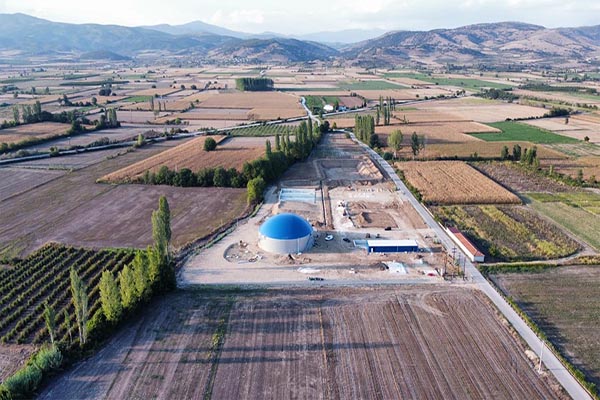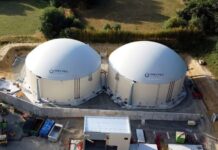The Greek agricultural sector has trusted WELTEC BIOPOWER‘s biogas technologies since 2007 – and this trend is continuing. Most recently, three biogas plants were built, which the German manufacturer designed together with its Greek cooperation partner Tetoros Machinery. Two of these are located in the Epirus region, in northwestern Greece: a 1-megawatt plant in the town of Arta and a 500-kilowatt plant in Ioannina. The third one, a 250-kilowatt biogas plant project, was realized in Serres, in central Macedonia. Here, an upgrade of the CHP plant to 750 kilowatts is also being implemented. The plant in Ioannina will go into production in the fall of 2023.
The region around Epirus is particularly rural. Poultry and cattle production dominate the area. As in many other intensive farming areas, the biomass supply there is higher than the processing capacity of the existing plants. The construction of new biogas plants and the modernization of existing ones are therefore profitable, especially since such projects are supported by subsidies. Thus, not least, the rich substrate supply at the three plant locations was also an important factor for the investment decisions.
At the 1-megawatt plant in Arta, 150 tons of cattle slurry and 50 tons of dry chicken manure are processed daily. At the biogas plant site in Ioannina, the daily input is made up of 100 tons of cattle slurry and 30 tons of dry chicken manure. And in Serres, a substrate mix of 40 tons of cattle manure and 10 tons of energy plants enters the stainless steel digester daily. Here, in addition to his cattle farming, the operator owns land on which corn is grown.
At all three sites, the materials are first sent to a pre-storage tank. Special agitators and pump technology ensures the pretreatment. In the digesters, the proven agitators then mix the substrates for efficient biogas production. The two digesters in Arta each hold 4436 cbm, in Ioannina there is a 3993-cbm digester, and the tank in Serres measures 4905 cbm. „All tanks are made of high-grade stainless steel,“ specifies the responsible process engineer at WELTEC BIOPOWER, Tobias Peuker. According to him, the fermentation residue from the digester with its high nutrient content can also be used as fertilizer afterwards.
The three biogas projects are an important part of the Greek energy transition. For example, according to a report by DAPEEP S.A., the Greek market operator for renewable energy sources, new biomass, and biogas plants with a total capacity of 7 megawatts came online in the first half of 2022. The Greek Energy and Climate Plan aims to double the share of renewable energy in electricity generation from 30 % in 2021 to 60 % in 2030. WELTEC BIOPOWER has already implemented a total of around 36 biogas plants and projects there since 2007. And the path to decarbonization continues to make progress: In the summer of 2023, Greece‘s entire one-day energy demand could have been supplied from renewable energy sources for the first time. „This means we are well on our way and will continue to make our contribution to achieving the goal,“ predicts WELTEC BIOPOWER‘s Greek sales partner, John Tetoros.








![SMART ENERGY WEEK [September] 2025 to Lead Global Renewable Energy Advancements SMART ENERGY WEEK](https://timestech.in/wp-content/uploads/2025/07/Untitled-design-2025-07-31T112230.406-218x150.jpg)









